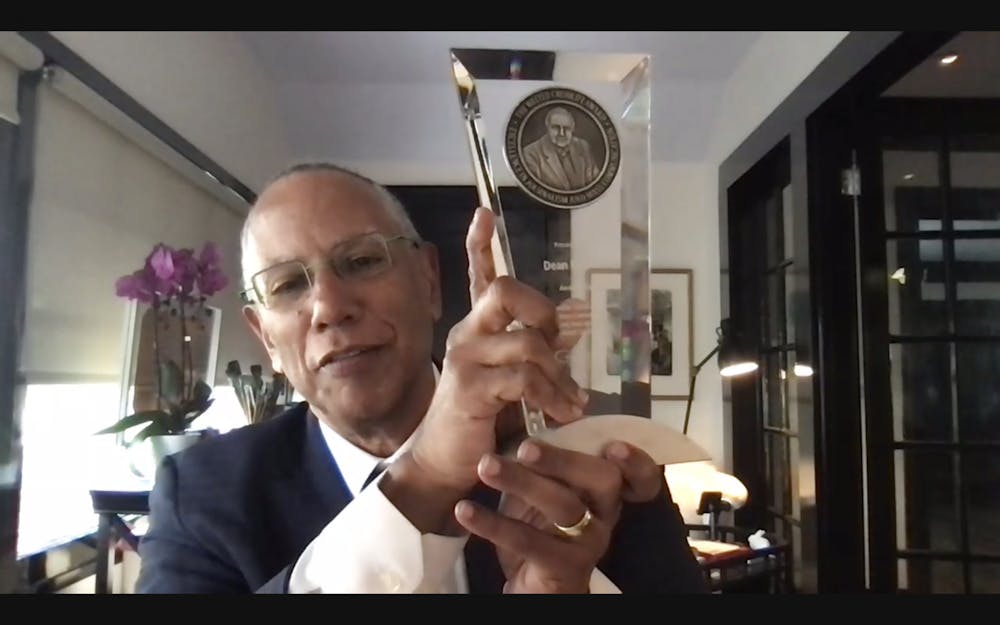Dean Baquet, who has been the executive editor for The New York Times since 2014, received the 37th annual Walter Cronkite Award for Excellence in Journalism during a virtual ceremony Thursday.
Cronkite interim Dean Kristin Gilger introduced the award recipient and University Provost Mark Searle presented the award to Baquet.
As executive editor, Baquet oversees over 1,700 reporters at one of the nation's top newsrooms. He is The New York Times' first Black executive editor in the paper's 170-year history.
A video made to honor Baquet and his journalism career played during the virtual ceremony and included testimonies from his colleagues at The New York Times and publications he worked for previously, such as The Los Angeles Times.
"Dean is a part of a breed of journalists that, particularly in newspapers, was the kind of person you would say had 'ink in his veins,'" said Keith Woods, the chief diversity officer for NPR, in the video. "He believes very much in the fundamental principles of good journalism, particularly shining light in dark places and holding the powerful to account and providing voice to people who couldn't get it."
"It also means a lot to get this from a school that believes deeply in the hands-on practice of journalism," Baquet said.
In his acceptance speech, he focused on the idea that the power of reporting within the journalism industry has eroded over time. He revealed that the very speech he was reciting was completed through his own reporting, in an effort to highlight its importance.
"I've spent the past couple of weeks talking to reporters and editors at The Times, BuzzFeed and Washington Post — collecting their stories, their surprises, their triumphs and their lessons," Baquet said. "I asked them to join me in reveling in reporting by telling me how they've been surprised, how they've had their promises tossed aside, or had conventional wisdom proven silly, even how they chased the tip, or a feeling in the gut."
Baquet told stories of reporters who learned the true value of reporting while working on articles about topics such as Harvey Weinstein and Bill O'Reilly's sexual abuse accusations, the murder of George Floyd, the Black Lives Matter movement, the Capitol insurrection in January and Donald Trump's taxes.
"A great reporter is always open to being proven wrong," he said. "At its best, journalism is the process we have built to come as close to the truth as humanly possible. We should be open to the challenges of that process. We should be humble about its limitations. We should learn that each generation will want to question it."
At the end of his speech Thursday, Baquet addressed students watching from computer screens at home, many of whom share a similar passion for journalism.
"I promise you, if you choose this life, you will have much more fun than anyone ever should," Baquet told the audience.
In an exclusive Q&A with Cronkite students Friday, Baquet expanded on the most fun moments he had experienced throughout his career in journalism. He noted his meeting with the President of Mexico, an interview with Gabriel García Márquez — a Colombian novelist — and traveling the world.
"I wake up on Monday morning, even at this stage of my career, not knowing what the week is going to look like," Baquet said. "I get to engage in the biggest, hardest subjects."
Before the COVID-19 pandemic hit, Baquet said if a story broke, he would send 10 people on an airplane to go cover it because the story always came first. Now, he said, the pandemic has changed that mindset.
"I learned this year the fact that everybody was experiencing, you know, some difficulty because of COVID that I learned more about understanding that people have lives to live. And I think I became more empathetic as a leader and as a boss," Baquet said. "I think I was okay hearing that people could not be on airplanes whenever I wanted them to."
McKenzie Allen-Charmley, a junior studying journalism and business who co-hosted the Q&A, asked Baquet what mentality he has maintained to keep him going, even in the toughest times of his career.
"Journalism has the grandest mission. It's to do the public good and to serve the public," Baquet replied. "Whenever I find myself struggling under criticism or struggling with internal turmoil, I remind myself that it's all in service of a large and important mission.”
At the end of his chat with students, Baquet gave his last words of advice to the aspiring journalists listening in.
"You're living through a period where everything's gonna look different in 10 years ... But you're going to get to reinvent this thing and I can't imagine anything more exciting than that," he said.
Reach the reporter at kkwilso5@asu.edu and follow @kaceywilson_ on Twitter.
Like The State Press on Facebook and follow @statepress on Twitter.
Continue supporting student journalism and donate to The State Press today.




